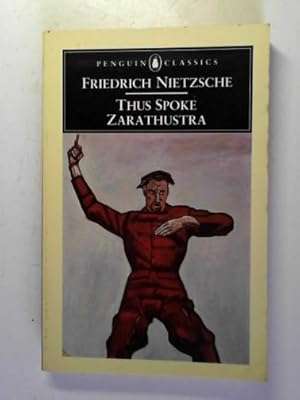Penguin Classics, softcover, 342 pages, condition: new.
Nietzsches most accessible and influential philosophical work, misquoted, misrepresented, brilliantly original and enormously influential
Nietzsche was one of the most revolutionary and subversive thinkers in Western philosophy, and Thus Spoke Zarathustra remains his most famous and influential work. It describes how the ancient Persian prophet Zarathustra descends from his solitude in the mountains to tell the world that God is dead and that the Superman, the human embodiment of divinity, is his successor. Nietzsches utterance God is dead, his insistence that the meaning of life is to be found in purely human terms, and his doctrine of the Superman and the will to power were all later seized upon and unrecognisably twisted by, among others, Nazi intellectuals. With blazing intensity and poetic brilliance, Nietzsche argues that the meaning of existence is not to be found in religious pieties or meek submission to authority, but in an all-powerful life force: passionate, chaotic and free.
Reading through Zarathustra as a teenager was a singularly powerful experience; the work defies categorization or genre, time or place. I was warned that Nietzsche was dangerous for young readers (like Machiavelli) because he went insane. This I HAD to read. It was my first encounter with existential thought, a stinging critique of the very nature of values and belief. The events in the book are more like Biblical parables than a plot unfolding, except that the lesson is not, "Thou Shalt" but "Why should I?" I wish I could read German well enough to understand the nuances of Nietzsche's original narrative. Full of surreal visions, Zarathustra is a challenge to interpret but at the same time, lacks the semantics of conventional philosophy that makes the field inaccessible for many young students. So many things are explored, celebrated or indicted with ambitious and sharp leaps of metaphors: Moral relativism, comparative theology and eternal recurrence, nothing short of the love of life, the will to life. Many fascinating discussions have explored what could have influenced Nietzsche: the social milieu of late 19th century Europe, the contradictions of Enlightenment thought, etc. Thus Spoke Zarathustra will forever retain its mystery and is a monument to Nietzsche's eccentricity.

